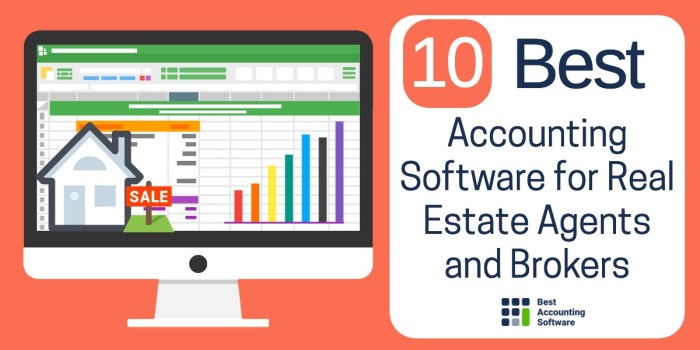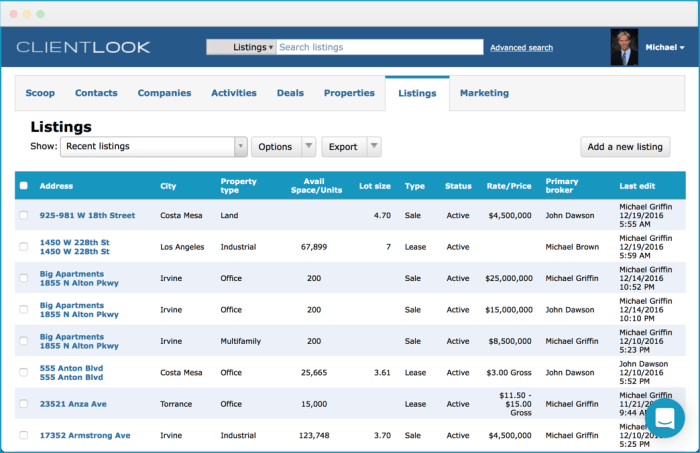Commercial real estate accounting software is transforming how businesses manage their properties. From meticulous record-keeping to sophisticated financial analysis, these tools provide a comprehensive approach to property management, ensuring accurate reporting and efficient workflows. This software is designed to cater to the unique needs of commercial real estate operations, simplifying complex financial processes and maximizing profitability.
The software offers a wide range of features, including automated expense tracking, lease management, tenant communication, and reporting. This streamlines operations, reducing manual data entry and potential errors, while offering real-time insights into key financial metrics. Furthermore, these tools often integrate with other business applications, creating a cohesive and efficient operational ecosystem.
Commercial real estate is a complex industry, demanding meticulous financial management. Effective accounting is crucial for profitability, compliance, and informed decision-making. Commercial real estate accounting software streamlines these processes, offering a powerful tool for property managers, investors, and developers. This guide delves into the intricacies of such software, highlighting its key features, benefits, and how to choose the right solution for your needs.
Understanding the Importance of Commercial Real Estate Accounting Software
Managing the financial aspects of commercial properties can be overwhelming. From lease accounting to property tax calculations, property management, and tenant relations, the demands are substantial. Commercial real estate accounting software automates these tasks, freeing up valuable time and resources for strategic initiatives. This automation translates to improved accuracy, reduced errors, and a more efficient workflow.
Key Features to Look For
- Lease Accounting and Management: Software should handle complex lease agreements, including both operating and finance leases. This includes accurate rent calculations, lease expensing, and compliance with accounting standards (like IFRS and US GAAP).
- Property Valuation and Budgeting: Tools for property valuation, expense tracking, and budgeting are critical. The software should allow for projections and scenario planning.
- Financial Reporting and Analysis: Comprehensive reporting features are essential. The software should generate various financial statements, including income statements, balance sheets, and cash flow statements. Advanced analytics to identify trends and patterns are also valuable.
- Tenant Management and Rent Collection: Integration with tenant portals for rent payments and communication can significantly improve efficiency. Automated reminders and penalties are desirable features.
- Integration with Other Systems: The ability to integrate with other business systems, like accounting software (e.g., Xero, QuickBooks), CRM platforms, and property management systems, is essential for seamless data flow.
- Compliance and Reporting: The software must adhere to all relevant regulations and reporting requirements for the specific jurisdiction. Automated compliance checks are beneficial.
Types of Commercial Real Estate Accounting Software
Several options cater to different needs and budgets. Some specialize in specific areas, like property management, while others are more comprehensive, encompassing various aspects of commercial real estate accounting.
Cloud-Based vs. On-Premise Solutions
Cloud-based software offers flexibility, scalability, and accessibility from anywhere with an internet connection. On-premise solutions provide greater control but often require significant upfront investment and IT infrastructure.
Software Providers and Reviews, Commercial real estate accounting software
Researching reputable providers and reading reviews is crucial. Look for solutions with strong customer support and a proven track record in the commercial real estate sector. Sites like Capterra and G2 offer valuable insights into various software options.
Benefits of Using Commercial Real Estate Accounting Software
Beyond streamlining processes, commercial real estate accounting software delivers significant advantages:
- Improved Accuracy and Reduced Errors: Automation minimizes manual data entry and calculation errors.
- Enhanced Financial Reporting: Generate reports quickly and efficiently, facilitating informed decision-making.
- Increased Efficiency and Productivity: Free up valuable time for strategic tasks and analysis.
- Improved Compliance and Risk Management: Adherence to regulations and identification of potential risks.
- Better Data Analysis and Forecasting: Identify trends and make better predictions for future performance.
Choosing the Right Commercial Real Estate Accounting Software
Consider your specific needs, budget, and the size of your portfolio when selecting the right software. Don’t be afraid to request demos and consult with experts. A trial period can be valuable to assess if the software meets your requirements.
Frequently Asked Questions (FAQ)
- Q: What is the cost of commercial real estate accounting software?
A: Pricing varies significantly depending on features, functionalities, and the provider. Contact potential vendors for specific quotes.
- Q: How long will it take to implement commercial real estate accounting software?
A: Implementation timelines vary based on the complexity of the system and the level of customization needed.
- Q: Can this software be integrated with my existing accounting system?
A: Most modern solutions offer integrations with popular accounting software and CRM platforms. Verify compatibility with your existing systems before purchase.
Conclusion: Commercial Real Estate Accounting Software
Commercial real estate accounting software is an indispensable tool for navigating the complexities of this industry. Its ability to streamline processes, enhance accuracy, and improve decision-making makes it a valuable investment for any commercial real estate professional. By understanding the key features, types, and benefits, you can select the right solution to optimize your operations and achieve sustainable growth.
Source References:
Call to Action (CTA): Ready to streamline your commercial real estate accounting? Explore our recommended software solutions and request a demo today! [Link to relevant resource/software]
In conclusion, commercial real estate accounting software empowers businesses to optimize their property portfolios by providing accurate financial data and efficient management tools. These solutions allow for better decision-making, enhanced profitability, and ultimately, a more successful real estate operation. With the right software, businesses can gain a significant competitive advantage by streamlining their operations and improving financial visibility.

Source: bestaccountingsoftware.com
FAQ Corner
What types of commercial properties can this software manage?
The software can handle various commercial properties, including office buildings, retail spaces, industrial facilities, and mixed-use developments. Specific features may cater to particular property types, but the core functionalities remain applicable across diverse property portfolios.
How does the software integrate with other business systems?

Source: clientlook.com
Integration capabilities vary depending on the specific software. However, many options integrate with accounting packages, CRM systems, and other relevant platforms, creating a streamlined workflow and centralized data repository.
What are the typical costs associated with implementing this software?
Software costs vary based on features, functionalities, and the size of the property portfolio. Some software offers tiered pricing plans, enabling businesses to select packages that align with their needs and budget. Implementation costs may also be factored in.